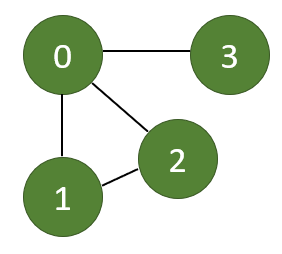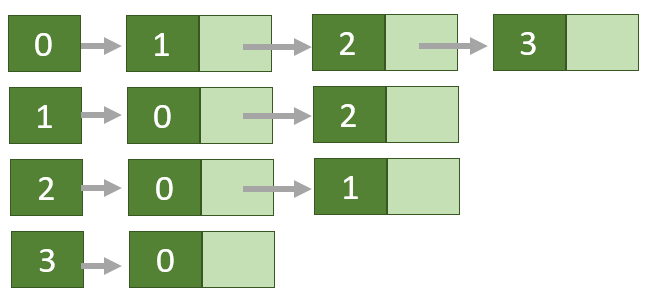Graph-based DSA: Adjacency List
- Harini Mallawaarachchi
- Mar 26, 2023
- 1 min read
A graph that is represented as an array of linked lists. The index of the array represents a vertex and each element in its linked list represents the other vertices that form an edge with the vertex.


Here, 0, 1, 2, 3 are the vertices and each of them forms a linked list with all of its adjacent vertices. For instance, vertex 2 has two adjacent vertices 0 and 1. Therefore, 2 is linked with 0 and 1 in the figure above.
Nodes = [0, 1, 2, 3]
Adjacency nodes for each node = [[1, 2, 3], [0, 2], [0, 1], [0]]An adjacency list can be created based on a graph edge list as below.
# Build the adjacency list of the graph
# n = 4
# edges = [[0,1],[0,2],[1,2],[0,3]]
def build_adj_list(self, n: int, edges: List[List[int]])
adjList = [[] for _ in range(n)]
for u, v in edges:
adjList[u].append(v)
adjList[v].append(u)
print(adjList) # [[1, 2, 3], [0, 2], [0, 1], [0]]Adjacency List Code #Python
class AdjNode:
def __init__(self, value):
self.vertex = value
self.next = None
class Graph:
def __init__(self, num):
self.V = num
self.graph = [None] * self.V
# Add edges
def add_edge(self, s, d):
node = AdjNode(d)
node.next = self.graph[s]
self.graph[s] = node
node = AdjNode(s)
node.next = self.graph[d]
self.graph[d] = node
# Print the graph
def print_agraph(self):
for i in range(self.V):
print("Vertex " + str(i) + ":", end="")
temp = self.graph[i]
while temp:
print(" -> {}".format(temp.vertex), end="")
temp = temp.next
print(" \n")
if __name__ == "__main__":
V = 5
# Create graph and edges
graph = Graph(V)
graph.add_edge(0, 1)
graph.add_edge(0, 2)
graph.add_edge(0, 3)
graph.add_edge(1, 2)
graph.print_agraph()
Comments